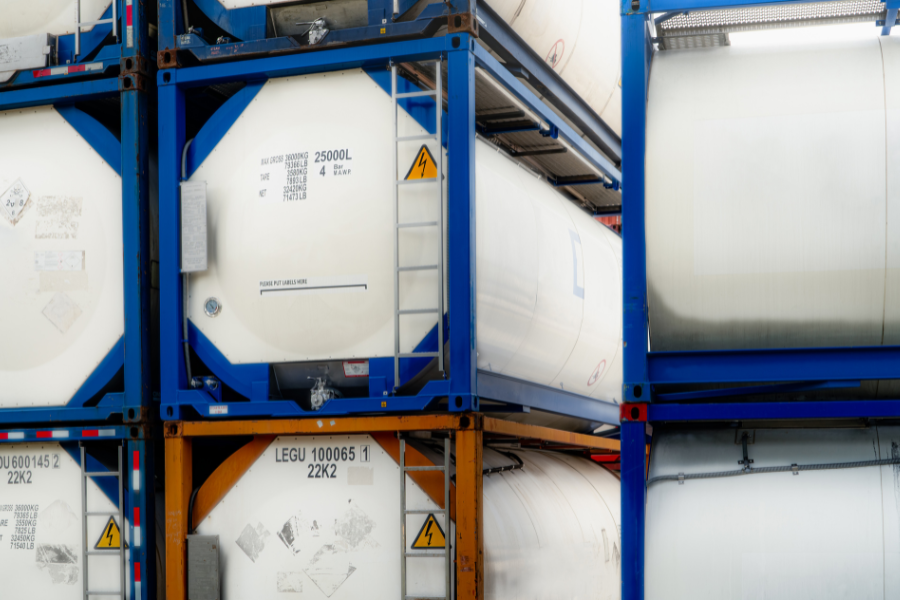For companies handling hazardous or reactive materials, the choice of chemical storage tanks is critical to ensuring safety, compliance, and long-term durability. These tanks must be specifically designed to contain chemicals that can pose risks to both personnel and the environment if improperly stored. Selecting the correct tank involves several considerations, including material type, construction features, and regulatory standards. Double-walled steel tanks with corrosion protection are widely recommended for industrial use, as they offer enhanced durability and safety. This article will guide you through the essential factors to consider when choosing a chemical storage tank tailored to your company’s needs.
For companies handling hazardous or reactive materials, the choice of chemical storage tanks is critical to ensuring safety, compliance, and long-term durability. These tanks must be specifically designed to contain chemicals that can pose risks to both personnel and the environment if improperly stored. Selecting the correct tank involves several considerations, including material type, construction features, and regulatory standards. Double-walled steel tanks with corrosion protection are widely recommended for industrial use, as they offer enhanced durability and safety. This article will guide you through the essential factors to consider when choosing a chemical storage tank tailored to your company’s needs.
Material and Construction – Why Steel with Corrosion Protection?
When choosing a tank for chemical storage, selecting the right material is crucial, especially for companies dealing with aggressive or reactive chemicals. Steel is a popular choice due to its strength and durability, but additional corrosion protection is essential to prevent degradation over time. Tanks made of steel with specialised anti-corrosion coatings ensure a longer lifespan, as they resist the corrosive effects of chemicals stored within. It is important to avoid standard stainless steel in this context, as it may not provide adequate resistance to certain chemical reactions. For industrial use, only double-walled steel tanks with protective coatings are advisable, as these reduce the risk of leaks and spills, providing an extra layer of security for both the chemicals and the surrounding environment.
Importance of Double-Walled Construction for Industrial Safety
Double-walled chemical tanks are essential for companies prioritising safety in their storage systems. This type of tank includes an internal and an external wall, creating a containment layer that protects against leaks. In the event of an inner wall breach, the secondary wall prevents chemicals from escaping, giving companies valuable time to respond before any environmental contamination occurs. Double-walled tanks are also mandated by many safety standards and regulatory guidelines, particularly for hazardous chemicals. This construction significantly reduces risks associated with chemical storage, protecting both the facility and its employees from potential exposure to harmful substances. For industries where safety is paramount, double-walled tanks with corrosion-resistant steel are the top recommendation.
Capacity and Sizing – Meeting Industrial Requirements
When selecting a chemical storage tank, determining the appropriate capacity is crucial to ensure efficient and uninterrupted operations. Companies need to assess their daily chemical usage, potential expansion needs, and storage requirements when choosing a tank size. Overly small tanks can lead to frequent refilling, disrupting workflow, while overly large tanks may lead to unnecessary costs and space usage. Steel chemical tanks are available in a wide range of sizes, and their double-walled design ensures that capacity does not compromise safety. Entrepreneurs should work closely with tank suppliers to determine the right tank size for their specific needs, taking into account both present demands and potential future expansion. The right capacity can streamline operations and ensure safer, more efficient storage practices.
Compliance with Industry Standards and Regulations
For businesses handling hazardous chemicals, regulatory compliance is essential. Chemical storage tanks must adhere to strict industry standards and regulations, which vary depending on the type of chemical stored and local environmental laws. Compliance ensures that companies avoid legal penalties and operate safely within industry guidelines. Double-walled steel tanks with anti-corrosion protection are often recommended to meet these stringent requirements, as they provide the resilience and containment required by regulatory bodies. When selecting a tank, companies should consult with suppliers familiar with current regulations and industry standards, ensuring that the chosen tank meets or exceeds these standards. Such compliance is crucial for protecting both the business and its reputation within the industry.
Maintenance Considerations for Long-Term Storage
Long-term chemical storage requires regular maintenance to ensure both the integrity of the tank and the safety of the stored chemicals. Maintenance procedures include regular inspections for signs of corrosion, leakage, and structural wear. Steel tanks with additional anti-corrosion protection are ideal for this purpose, as they reduce the frequency of maintenance required by providing long-lasting durability. Double-walled tanks also simplify maintenance, as the outer wall can be checked for signs of chemical exposure without disturbing the inner containment. Entrepreneurs should establish a regular maintenance schedule and work with professionals who can perform detailed assessments, ensuring that their chemical tanks remain secure and compliant over time. Proactive maintenance is essential for industrial companies looking to manage risks associated with chemical storage.

